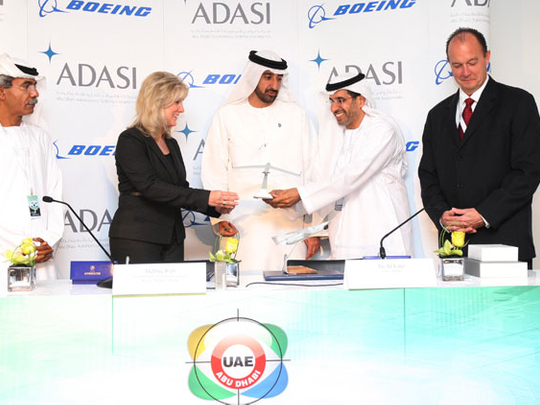
Abu Dhabi Autonomous Systems Investments (Adasi), a Tawazun subsidiary, and aircraft manufacturer Boeing on Monday signed a teaming agreement to address the growing demand in the Middle East market for unmanned systems.
Adas said in a statement that the agreement was signed at the International Defence Exhibition and Conference (Idex) 2013, which is taking place in Abu Dhabi until February 21.
Homaid Al Shemmari, chairman of Adasi, said: “Today’s announcement is an important continuation of our strategy to build innovative aerospace capabilities in the Middle East. our homegrown expertise coupled with Boeing’s technical capabilities in unmanned aircraft systems is a winning combination and one that we look forward to strengthening in the coming years.
“The agreement is poised to have a significant contribution to the ongoing drive to develop UAE national capabilities within Adasi.”
Al Shemmari added that Boeing’s direct investment “will open many opportunities for Adasi’s UAE nationals to develop their knowledge and skills through Boeing’s world-leading capabilities and experience in the management and implementation of technical programmes.”
Debbi Rub, a vice-president and general manager in Boeing military aircraft, told Gulf News that the agreement will enable Adasi to provide training, support and marketing services for Boeing’s ScanEagle and Integrator unmanned aircraft systems in the UAE.
“We have this agreement with the UAE with prospects to expand into the Middle East and North Africa region,” said Rub. “This agreement advances Boeing’s strategy of partnering with best-in-industry companies such as Adasi.
“We plan to continue investing and growing in the UAE and the broader Middle East region in order to support USA allies’ growing enduring need for affordable intelligence, surveillance and reconnaissance (ISR) solutions such as ScanEagle and Integrator.”
The agreement is meant to “develop a firmer partnership in the region for training and maintenance, to support not only the [Adasi] HQ and the UAE but also other partners in the region with our critical ISR (intelligence, surveillance and reconnaissance) capability,” said Rub.
For his part, Jeff Johnson, Boeing Middle East president, told Gulf News that the agreement expands the previous one and will allow for support and sustainment of unmanned ISR products and services.
“Boeing continues to demonstrate its enduring commitment to the UAE and not just by delivering commercial aircraft and defence systems, but also through solid partnerships such as this latest agreement,” said Johnson. “In this way, we can help the UAE achieve its national objective of providing new career opportunities for its people.”
Rub said that as a result of this agreement we will see more Boeing staff on the ground. “Things like if there is a natural disaster, the ISR capability of scanning and helping people on the ground... as well as other issues important to the UAE related to pipeline piracy, which can also cause environmental conditions,” she said.
Johnson said: “What we have worldwide now is ScanEagle, which is deployed in various regions, with both US government as well as the [Adasi] HQ as several of the units other governments do to provide IRS capability.”
He stressed that what Boeing will be doing is training and maintenance.
Asked about the value of the deal, Rub said: “Not a contract but an agreement to work together. No particular value right now but the region needs this capability so they are working together so that we can grow this sort of business.”
“There are intensions with Adasi to establish this as the centre in the Middle East for the ScanEagle and Intergrator contracts. We do have a contract now with the [Adasi] HQ on delivering some of these platforms and this will over time allow us.”












